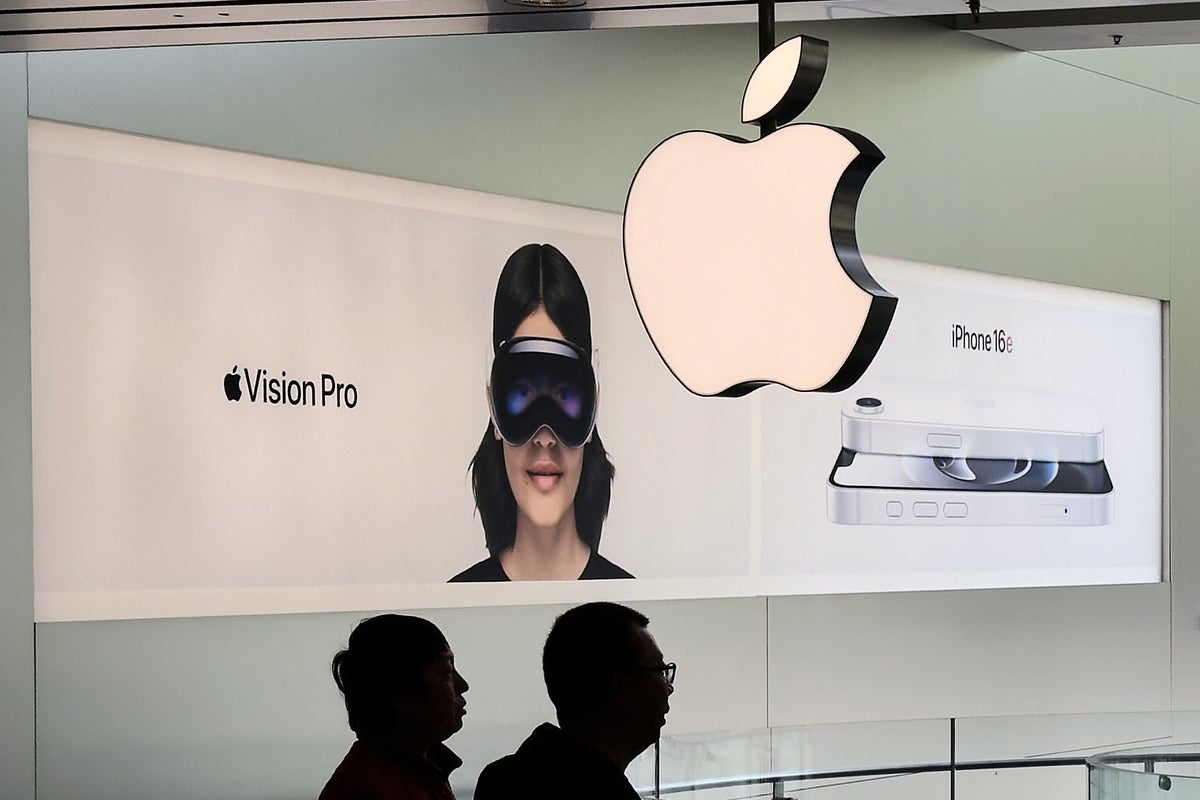
Apple has publicly addressed two of its major problems in its latest results: the effect of Donald Trump’s tariffs and the delay of headline features for the new iPhones.
The company reported its latest results on Thursday evening, beating Wall Street’s expectations and announcing record revenues. But they did not fully soothe concerns about upcoming issues at the company, and Apple’s shares fell.
Apple said that the tariffs could add up to $900 million to its costs in the current quarter, and that most iPhones for the US would no longer be made in China, which has been particularly hard hit by the tariffs.
Tim Cook, the company’s chief executive, also addressed the widely publicised delay of new AI features, branded as Apple Intelligence, which had been planned for release with the new iPhone but are still yet to arrive.
The Cupertino, California-based company earned $24.78 billion, or $1.65 per share, in the first three months of the year, up 4.8% from $23.64 billion, or $1.53 per share, in the same period a year earlier.
Revenue rose 5.1% to $95.36 billion from $90.75 billion.
Analysts, on average, were expecting earnings of $1.62 per share on revenue of $94.19 billion, according to a poll by FactSet.
The numbers for the January-March period provide a snapshot of how Apple was faring before President Trump's unveiling of sweeping tariffs in April that rattled the financial markets amid fears a trade war would reignite inflation and shove the U.S. economy into a recession.
Apple’s reliance on Chinese factories to make its iPhones and other devices thrust the technology trendsetter into the crosshairs of Trump’s trade war. The exposure caused Apple’s stock price to plunge 23% shortly after the president announced the severity of the reciprocal tariffs, temporarily erasing $773 billion in shareholder wealth in the process.
Most of those losses have since been recovered after Trump temporarily exempted iPhones and other electronics from the reciprocal tariffs, but Apple’s stock remains down by nearly 5% since the April fusillade of tariffs.
Besides the trade war, Apple has been hurt by its inability to live up to its own hype surrounding artificial intelligence features on the iPhone 16 lineup that came out last fall.
The technology wasn’t ready when the iPhone 16 went on sale. Some AI features have rolled out in parts of the world as part of software updates, but Apple still hasn’t been able to live up to its original promise to make Siri smarter and more versatile. The missteps prompted Apple to pull advertising campaigns promoting AI breakthroughs on the iPhone, although the company still intends to release more features powered by the technology at some point.
In an investor call, Mr Cook acknowledged the delay but said that the new features were still coming.
“However, with regard to the more personal Siri, as you mentioned, we just need more time to complete the work so they meet our high-quality bar,” he said. “There’s not a lot of other reason for it.
“It’s just taking a bit longer than we thought, but we are making progress and we’re extremely excited to get the more personal Siri features out there.”
Apple had been counting on its late entry into the AI craze to revive demand for the iPhone after last year’s sales dipped 2% from 2023’s levels. Apple said Wednesday that its phone sales climbed 1.9% to $46.84 billion for the first three months of the year. Wall Street had expected iPhone sales of $45.62 billion.
When Trump initially indicated his 145% tariffs on Chinese-made goods would apply to the iPhone, U.S. consumers rushed to stores to buy new devices rather than risk prices spiking higher after the duties began driving up costs. But the flurry of panic buying won't show up until Apple reports its results for the April-June quarter this summer.
Trump's trade war has ramped up the pressure on Cook to work the same diplomatic sleight of hand that enabled the iPhone to avoid being stung by the China tariffs that the president imposed during his first administration.
Cook signaled his intention remain on good terms with Trump by arranging private meetings with him and personally donating $1 million to the president's second inauguration ceremony before sitting on the dais when Trump was sworn into office on January 20. Apple subsequently announced plans to invest $500 billion in the U.S. while hiring 20,000 workers during the next four years.
Trump's trade war also is prompting a push to Apple to shift all the production of the iPhones that it sells in the U.S. from China to India, where the company has been building up its supply chain for the past seven years, according to a recent story in the Financial Times. But the complicated logistics of making such a huge move likely couldn't be completed until next year, at the earliest, leaving Apple vulnerable to the vagaries of Trump's trade war.
Apple's stock fell $5.81, or 2.7%, to $207.51 in after-hours trading.
Additional reporting by agencies
TikTok fined £452m by EU authorities over data transfers to China
US judge releases new ruling that could profoundly change iPhone’s App Store
Samsung warns US tariffs will hit demand for electronics
M&S ‘working day and night’ to manage impact of cyber attack
Mark Zuckerberg thinks Meta’s AI friends can help cure loneliness epidemic
The M&S cyberattack has caused chaos – the UK’s enemies will be watching and learning







